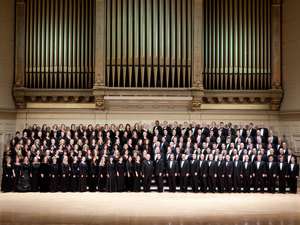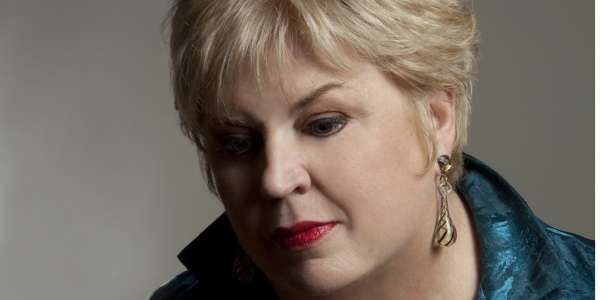|
Back
Shadows of Beethoven New York
Isaac Stern Auditorium, Carnegie Hall
03/06/2012 -
Ludwig van Beethoven: Missa Solemnis, Opus 123
Christine Brewer (Soprano), Michelle DeYoung (Mezzo-soprano), Simon O’Neill (Tenor), Eric Owens (Bass-Baritone)
Tanglewood Festival Chorus, Boston Symphony Orchestra, John Oliver (Conductor)

Tanglewood Chorus (© Michael J. Lutch)
Comparisons are odious, but I venture that conducting Beethoven’s Missa Solemnis is a far far more formidable challenge than conducting Bach’s B Minor or Mozart’s Requiem. The latter two are singularly heterogenous, with sharp differences of emotions, soloists, orchestra and words, that even a mediocre conductor could (theoretically) go on auto-pilot and allow the written score to do the work.
The Beethoven needs work. For its first three-fifths, up to the Sanctus and Benedictus, the Mass can sound monolithic. It is very loud and very high, the sounds of the orchestra are charmless, the soloists and chorus drive each other like a freight train carrying one car after another of solos and choruses, fugues, declarations and (to quote the Tennyson poems), canons to the left of us, canons to the right of us...
Excitement and grandeur? Yes, the Missa Solemnis has both. Religiosity? Maybe not so much. But this is definitely a challenge, whether for theater or church, and it takes a master conductor to master it all.
Kurt Masur, now 84 years old, canceled this concert at the last minute due to “health reasons.” But without a young Bernstein to step in, the Boston Symphony Orchestra had to turn to the one man who knew the choruses inside out. After all, John Oliver not only founded the Tanglewood Chorus some 40 years ago, but he has been their conductor, mentor and spiritual guide. And while known first and foremost as a choral conductor, his biography does list some a few orchestral jobs over the years.
That was probably not enough. His conducting was careful, if unadventurous. One doesn’t like to criticize the gestures of a conductor if they work, but his were the circular motions of a choral conductor. The result, up to the final sections, gave all the lines of Beethoven, but the result was still-born.
Certainly the Tanglewood Chorus sung with authority. But they have about 150 members, all singing in one voice, and the result was rigid, somewhat uniform. Or more appropriate, their masses made a weighty performance inevitable, and with that weight came a certain monotony.
Granted, the opening Kyrie and Gloria were filled with the glory of Beethoven, all the wondrous affirmation of devotion. After this, though, one needs contour, shaping. The slower sections of the Credo gave temporary relief, but when the chorus started again, it was a return to volume, squarely straightforward vocalizing and...well, perhaps something devotional left by the wayside.

C. Brewer (© Christian Steiner)
That certainly wasn’t true with the four soloists, all of whom deserved whatever bouquets are thrown after a Mass. Perhaps they didn’t have time for personality, but had the powerful voices that could vie with that powerful chorus.
Of course Christine Brewer is familiar here, effortlessly essaying her lines, as were tenor Simon O’Neill, Mezzo Michelle DeYoung and baritone Eric Owens. They had few chances, though, until the end of the Missa Solemnis, especially in the one section which made the performance worthwhile
The Sanctus and Benedictus, for the first time, gave space for the Boston Symphony to offer a few bars on their own, quiet bars introducing not only the soloists but First Chair violinist Malcolm Lowe. His playing around the voices, was an inspiration equal to the inspiration of the composer.
And the final Agnus Dei has one choral phrase which is as fine as anything Beethoven ever wrote, on the word pacem and repeated throughout. It is irresistible. And while this Missa Solemnis was less an organic body and more of a musical silhouette, the ending was equal to Beethoven’s grandest and most spiritual thoughts.
Harry Rolnick
|